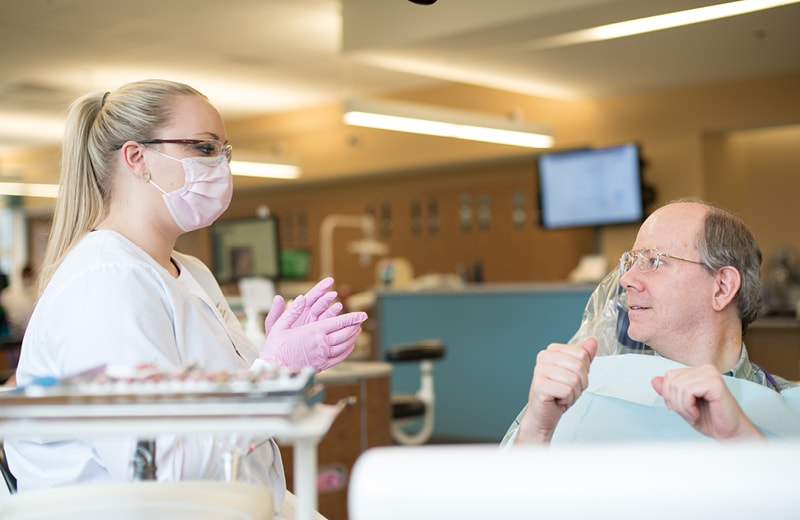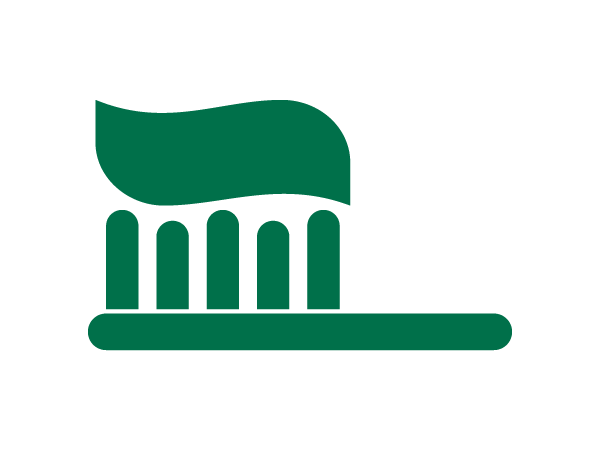Program Overview

The role of a registered dental hygienist is to provide dental hygiene services and teach patients how to prevent dental disease. A registered dental hygienist provides care for dental patients under the supervision of a dentist. The preventive and therapeutic treatments and services are prescribed by the dentist.
Treatment and services provided by a registered dental hygienist are: scaling and root debridement; application of topical fluoride for the prevention of tooth decay; sealants, impressions, prepare diagnostic models; expose dental radiographs; provide instructions for patient self-care and nutritional counseling; and perform laboratory procedures. Duties of registered dental hygienists do vary from state to state. In Michigan, registered dental hygienists also provide local anesthesia and nitrous oxide to patients 18 years of age and older.
With this program, you have the opportunity to earn a second associate degree in General Management at the same time as your dental hygiene associate's degree. It's a great way to get that business background and increase earning potential.
Students should complete the business course requirements for the dual degree before beginning clinical work as a dental hygiene student.
About Delta's Program
The Dental Hygiene Program is an education unit within Delta College’s Health and Wellness Division. It is a highly competent professional program adhering to comprehensive outcomes/competencies and objectives. The commitment of the faculty is to create an educational environment that facilitates growth in knowledge and skills, develops responsible self-directed and lifelong learners as health professionals. The faculty members are committed to providing learning climates that will develop the full potential of the individual. To meet the obligations to our students, to ourselves and to the communities, the focus is continuous quality improvement through teaching and learning.
Prior to entering the Dental Hygiene program, the student completes 30-34 prerequisite courses. The Dental Hygiene program is five semesters and four of the five semester are 18 credit hours. The student will attend labs, clinics, and classes approximately 35 hours per week. The student will need to commit to many hours of study per week as well as completing tests, assignments, projects and papers outside of class.
Professional licensure
Each state has it's own licensing. Other states may accept the regional board exam that Michigan requires Commission on Dental Competency Assessment (CDCA) that our students take, but students are required to become licensed in each state separately and may require further testing (such as a jurisprudence exam or more). Some states require a minimum number of years of clinical experience as a licensed RDH in another state or retaking exams depending how long it has been since the licensing exams were taken. there is no guarantee of licensing in another state. You may apply and that state's licensing board will look at your credentials/education and decide. Please contact the Coordinator for further information.
The Dental Hygiene Program is accredited by the Commission on Dental Accreditation (CODA).
Commission on Dental Accreditation
211 East Chicago Avenue
Chicago, Illinois 60611
800.621.8099 or 312.440.4653
Getting your degree in the health field is unique compared to other programs. You first take your prerequisite core courses and then you apply for validation.
What's validation?
The Registrar's Office validates your prerequisite courses to confirm you are eligible to begin the clinical portion of your program.
Success Tips
- Declare the Dental Hygiene program.
- Meet with your advisor regularly. Stay on track with what you need to do to apply.
- Apply for validation with the Registrar's Office once you've started your final semester of prerequisite courses.
- Stay connected for important updates from Delta.
Dental Hygiene Program Goal
The program will provide career education to prepare entry-level dental hygienists.
Dental Hygiene Program Competencies
- Assess, plan, implement and evaluate Dental Hygiene services and treatment to individuals and the community.
- Assess, analyze and incorporate evidence-based decision making in the management of patients/clients for continuous lifelong learning.
- Manage infection and hazard control.
- Manage medical emergencies.
- Participate in professional events in the community and model professional behaviors including ethical, legal, interpersonal skills, and professional appearance.
- Solve problems individually and in a team environment.
Infection Control
As a student dental hygienist, during patient treatment, there is a risk of exposure to blood, saliva, aerosols, and punctures. Therefore, during the program, the student will learn about various diseases and how to prevent transmission of disease both to patients and yourself.
Board Examination Pass Rates
- 2018 Graduates, 100%
- 2019 Graduates, 100%
- 2020 Graduates, 100%
Licensure Rates
- 2018 Graduates, 100%
- 2019 Graduates, 100%
- 2020 Graduates, 100%
Employment Rates
Full or Part Time Employment six months after licensure
- 2018 Graduates, 100%
- 2019 Graduates, 100%
- 2020 Graduates, 100%
Source: Results from Board Examiners, personal contact
Why you should choose Delta
In 2013, the dental area was completely renovated. The new dental clinic is a state of the art facility.
The Dental Hygiene program was developed in 1975 and has a history of student success. The Dental Hygiene program is fully accredited by the Commission on Dental Accreditation (CODA). The students are successful in passing the five board examinations that are required for licensure as a dental hygienist.
One of the very best things about Delta College is your ability to start here and go anywhere. And, in the process, save thousands of dollars. It's a smart choice!
In fact, if you're interested in earning a bachelor's in Dental Hygiene or Allied Health Sciences you have several options by coming to Delta first, and then transferring.
- Earn a bachelor's degree in Dental Hygiene from University of Detroit Mercy
- Earn a bachelor's degree in Allied Health Sciences from Ferris State University
Delta College has many other articulation agreements with four year colleges. The colleges accept many of Delta's credits allowing students to complete a bachelor degree in a short amount of time.
The transferability of courses between colleges/universities depends on the institution into which you transfer. Visit Transfer Programs and Procedures to see the full procedure.
Facts & Figures

100% of Dental students find jobs when they graduate.

100% of Dental students pass their national and state licensure exams. Go Delta!
Related Programs
Delta College offers over 140 degree, certificate and training options. Continue exploring and advancing your education with these related programs: